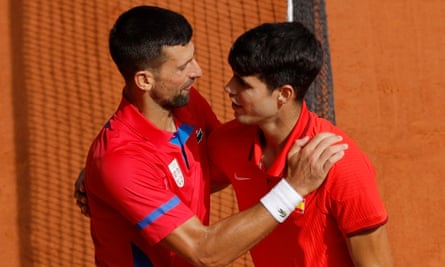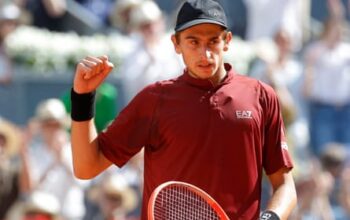As Jannik Sinner digested his first triumph at the US Open on Sunday, afternoon, his victory closed out the first year since 2002 in which none of Novak Djokovic, Rafael Nadal and Roger Federer has won a grand slam title, putting a new complexion on the sport. The Big Three era, once the focal point of men’s tennis, which in recent years has been held up solely by Djokovic’s excellence, is finished.
There was once a time when it seemed like there might be a period of uncertainty as the old greats finally disappeared into the night, a long transition as players fought to see how they would come out on top in a new era. Instead, Sinner and Carlos Alcaraz have snatched the reins with stunning self-assurance. By splitting the four grand slam titles between them this year, they have positioned themselves as the two leading figures of men’s tennis.
This does not mean Djokovic will never win another – or even numerous – grand slam titles. Even at 37 years old, it is pointless to count out a player who has spent his career triumphing from improbable positions. His performance at the Olympics showed he still clearly possesses the level required to win on the big stage and he would not trade that gold medal for any other trophy on offer this year.
But after years of having the biggest target on his back, he is now part of the chasing pack again. What seems clear is that, in the coming months, Djokovic will have to sit down and decide if, after all the records he has achieved, he is still truly motivated to make all the sacrifices he has endured throughout his career in order to be successful.
The dynamics between players born in the 1990s and the 2000s are also interesting, with the former group being almost completely passed over. Following the 2001-born Sinner’s win against Taylor Fritz, who was born in 1997, tennis players born in the 1990s now have a 1-18 win- loss record in grand slam finals against players of other decades. The players born in the 2000s are now 6-0. Dominic Thiem, who retired from grand slam competition in New York, and Daniil Medvedev remain the only men’s major champions born in the 90s.

Many of those players also left New York in disarray. After being dumped out in the first round, Stefanos Tsitsipas suggested he was suffering from long-term burnout. Alexander Zverev, the fifth-highest prize money earner in the history of the ATP, was punished for cowering miles behind the baseline in the important points of his quarter-final loss to Fritz, as is usually the case in his biggest matches. Andrey Rublev, also as usual, lost his head four games into his five-set fourth-round defeat by Grigor Dimitrov and had to take a medical timeout because of his bloody hands after punching his strings.
Dimitrov himself retired from his second consecutive grand slam tournament, brutal injuries ruining what had been a resurgent year for the veteran. Although Medvedev remains in the mix for the majors, his quarter‑final performance against Sinner was extremely disappointing. While Fritz enjoyed the best tournament of his life, the final showed his limitations as he was outplayed by a superior tennis player.
after newsletter promotion
Meanwhile Alcaraz and Sinner, at just 21 and 23 respectively, will continue to grow, particularly as they push each other. It was Alcaraz who set the tone, defeating Sinner in their instant classic 2022 US Open quarter-final and racking up major titles from such a young age. He continued to separate himself this summer by doubling his grand slam title count to four and winning on all surfaces, with a first victory at Roland Garros.
Sinner has not only responded with a second grand slam title of his own, but he has set his own example with his consistency in what has become one of the most formidable breakout seasons of the 21st century and also one of the most dominant 12-month runs on hard courts. As Alcaraz works towards piecing together a spectacular full season of his own, it remains to be seen if any other player will be inspired to step up and meet both players at the top.


